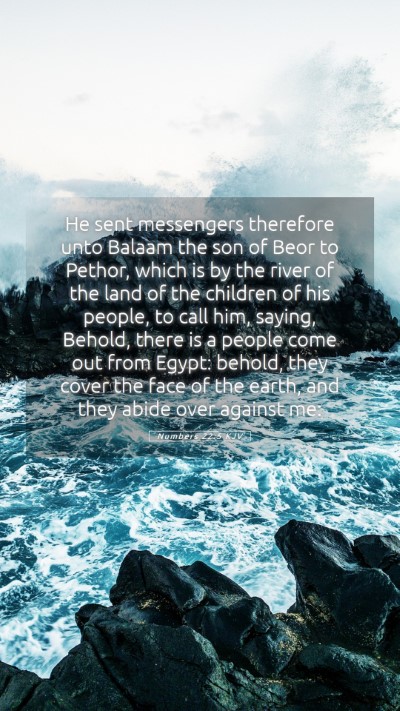Understanding Numbers 22:5
Numbers 22:5 states: "He sent messengers therefore unto Balaam the son of Beor to Pethor, which is by the river of the land of the children of his people, to call him, saying, Behold, there is a people come out from Egypt: behold, they cover the face of the earth, and they abide over against me."
Bible Verse Meanings
This verse reflects the actions of Balak, the king of Moab, who, upon seeing the Israelites, felt threatened by their presence. Balak's sending of messengers to Balaam indicates his desperate need for assistance against what he perceived as a formidable enemy.
Bible Verse Interpretations
The interpretation reveals Balak's understanding of the Israelites from a human perspective—they were numerous and had a history of victories. This initiates the central theme of divine versus human agency throughout the chapter.
Bible Verse Understanding
- Historical Context: The Israelites' departure from Egypt was a pivotal point in their history, symbolizing freedom from oppression.
- Balaam's Reputation: Balaam was known for his prophetic abilities, which made him a target for leaders like Balak seeking to influence circumstances.
- Significance of the Location: Pethor near the Euphrates signifies a link with the distant lands and the people that Balak belonged to.
Bible Verse Explanations
According to Matthew Henry, Balak’s appeal to Balaam illustrates the inclination of rulers to seek supernatural insight into their situations. Albert Barnes adds that Balaam’s character is complex; he exhibits both a fear of God and a desire for wealth and power, which ultimately leads to his downfall.
Bible Verse Commentary
Adam Clarke emphasizes the irony of Balaam’s spiritual blindness. Although he was sought after for his supposed connection to God, his motivations were not aligned with divine intentions. The verse encapsulates the conflict between earthly authority and divine sovereignty, as seen in Balaam’s eventual confrontation with God.
Scripture Analysis
This verse can be seen as a broader commentary on how worldly leaders often seek guidance from those who may not have pure intentions but wield perceived spiritual power. It sets the stage for understanding the moral dilemmas that follow as the narrative progresses.
Biblical Exegesis
This passage in Numbers serves as an introduction to a critical conflict that has broader implications about obedience, faith, and the nature of God’s will in human affairs. It challenges readers to consider whom they trust for guidance in their lives.
Bible Study Insights
Understanding Numbers 22:5 in the context of the whole narrative invites deeper contemplation about leadership, spirituality, and the consequences of seeking earthly wisdom over divine guidance.
Cross References
- Deuteronomy 23:4 - Discusses the historical enmity between the Israelites and Moabites.
- Numbers 23:8 - Balaam's proclamation that he cannot curse what God has blessed.
- Revelation 2:14 - Refers to Balaam as a figure who taught others to sin, emphasizing moral compromise.
Conclusion
This rich tapestry of interpretation across multiple commentaries allows for a comprehensive understanding of Numbers 22:5, demonstrating the complex interplay of divine purpose and human action in biblical narratives.
For those delving into Bible study groups or engaging in online Bible study, these insights will serve as valuable resources for understanding Scripture. When exploring how to interpret Bible verses, this passage offers profound lessons on the significance of seeking God’s will over our interpretations.


